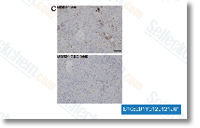Even though improvements on productive therapy have getting difficult to attain within extremely youthful children, prevention is a significant want and, as a result, the clarification of etiology ought to be tirelessly pursued. Background Survival for sufferers with metastatic colorectal cancer has improved appreciably above the past 15 years, largely resulting from improved systemic therapy possibilities. The availability of biological agents inhibiting angiogenesis by means of vascular endothelial growth element pathway and targeting oncogenic cell signaling by means of epidermal growth component receptor have contributed to these enhanced outcomes. Using the advent of new treatment alternatives has come the search for predictive biomarkers to assist collection of patients probably to benefit from these agents and equally to prevent toxicity and cost for those who are unlikely to benefit.
RAS gene mutation stays the sole validated predictive LY 2835219 marker in mCRC and predicts for lack of advantage to anti EGFR monocloncal antibodies cetuximab and panitumumab. On top of that to RAS, mutation of genes involved in downstream EGFR signaling pathways Ras Raf MAPK and PI3K AKT are already proposed to confer resistance to anti EGFR MoAbs. Exclusively, mutations in BRAF and PIK3CA genes are more likely to pre dict Chondroitin resistance to anti EGFR MoAbs whilst analyses on retrospective cohorts have already been conflicting. PTEN is an significant detrimental regulator of PI3K AKT pathway and controls cell proliferation, survival and angiogenesis. Loss of PTEN perform prospects to persistent activation of the PI3K pathway and has become observed in breast, prostate, glioblastoma, endometrial and colon can cers.
Reduction of PTEN perform, commonly evaluated by reduction of PTEN protein expression, has become suggested as each prognostic in mCRC as well as a predictive  bio marker for response to anti EGFR MoAbs although outcomes remain conflicting and hard to interpret. Various critical variables make testing and interpretation of PTEN difficult. Loss of PTEN function success from many genetic mechanisms like small scale PTEN gene mutations, allelic reduction at chromosome ten and epigenetic silen cing by means of hypermethylation of your PTEN promoter area. PTEN gene mutations are somewhat uncommon, oc curring in 2. two 12% of CRC specimens and there fore account for only a compact proportion of loss of PTEN expression on IHC staining. This highlights the position of alternate mechanisms such as allelic reduction and epigenetic silencing in impairing protein expres sion. These mechanisms are likely to coexist resulting in a second hit and leading to bi allelic inactivation. Even more complicating the predicament, the frequency of reduction of PTEN expression increases from progression from standard colonic mucosa to adenoma, primary CRC and in the long run metastasis.
bio marker for response to anti EGFR MoAbs although outcomes remain conflicting and hard to interpret. Various critical variables make testing and interpretation of PTEN difficult. Loss of PTEN function success from many genetic mechanisms like small scale PTEN gene mutations, allelic reduction at chromosome ten and epigenetic silen cing by means of hypermethylation of your PTEN promoter area. PTEN gene mutations are somewhat uncommon, oc curring in 2. two 12% of CRC specimens and there fore account for only a compact proportion of loss of PTEN expression on IHC staining. This highlights the position of alternate mechanisms such as allelic reduction and epigenetic silencing in impairing protein expres sion. These mechanisms are likely to coexist resulting in a second hit and leading to bi allelic inactivation. Even more complicating the predicament, the frequency of reduction of PTEN expression increases from progression from standard colonic mucosa to adenoma, primary CRC and in the long run metastasis.
Microrna Assay
MiRNAs are thought to be involved in the regulation of many developmental and biological processes.
